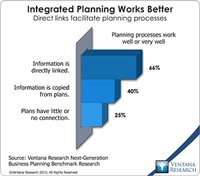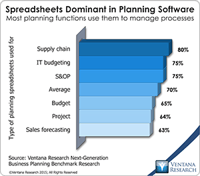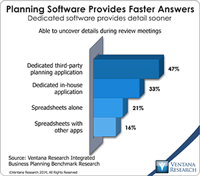Tidemark Systems offers a suite of business planning applications that enable corporations to plan more effectively. The software facilitates rapid creation and frequent updating of integrated company plans by making it easy for individual business functions to create their own plans while allowing headquarters to connect them to create a unified view. I coined the term “integrated business planning” a decade ago to highlight the potential for technology to substantially improve the...
Read More
Topics:
Planning,
Sales Performance,
Supply Chain Performance,
Customer Experience,
Human Capital,
Marketing Planning,
Reporting,
Budgeting,
Operational Performance,
Analytics,
Business Performance,
Customer & Contact Center,
Financial Performance,
Business Performance Management (BPM),
Business Planning,
Financial Performance Management (FPM),
Demand Planning,
Integrated Business Planning,
Project Planning
Our benchmark research on next-generation business planning finds that a large majority of companies rely on spreadsheets to manage planning processes. For example, four out of five use them for supply chain planning, and about two-thirds for budgeting and sales forecasting. Spreadsheets are the default choice for modeling and planning because they are flexible. They adapt to the needs of different parts of any type of business. Unfortunately, they have inherent defects that make them...
Read More
Topics:
Planning,
Predictive Analytics,
Marketing Planning,
Reporting,
Sales Forecasting,
Budgeting,
Customer Performance,
Operational Performance,
Analytics,
Business Analytics,
Business Collaboration,
Business Performance,
Financial Performance,
Business Planning,
Demand Planning,
Integrated Business Planning
Adaptive Insights held its annual user group meeting recently. A theme sounded in several keynote sessions was the importance of finance departments playing a more strategic role in their companies. Some participating customers described how they have evolved their planning process from being designed mainly to meet the needs of the finance department into a useful tool for managing the entire business. Their path took them from doing basic financial budgeting to planning focused on improving...
Read More
Topics:
Planning,
Predictive Analytics,
Human Capital,
Marketing,
Reporting,
Sales Forecasting,
Budgeting,
Customer Performance,
Operational Performance,
Analytics,
Business Analytics,
Business Collaboration,
Business Performance,
Financial Performance,
Business Planning,
Supply Chain,
Demand Planning,
Integrated Business Planning,
Project Planning
Business planning includes all of the forward-looking activities in which companies routinely engage. Companies do a great deal of planning. They plan sales and determine what and how they will produce products or deliver services. They plan the head count they’ll need and how to organize distribution and their supply chain. They also produce a budget, which is a financial plan. The purpose of planning is to be successful. Planning is defined as the process of creating a detailed formulation of...
Read More
Topics:
Big Data,
Planning,
Predictive Analytics,
Sales Performance,
Supply Chain Performance,
Human Capital,
Marketing,
Office of Finance,
Reporting,
Sales Forecasting,
Budgeting,
Operational Performance,
Analytics,
Business Analytics,
Business Collaboration,
Business Performance,
Customer & Contact Center,
Financial Performance,
Business Planning,
Supply Chain,
Demand Planning,
Integrated Business Planning,
Project Planning,
S&OP












